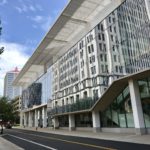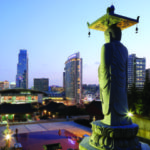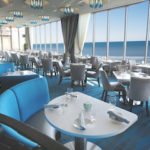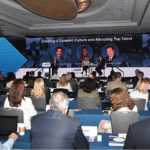
That advice came straight from the city’s first citizen, Lord Mayor Robert Doyle, who greeted media and approximately 500 hosted buyers during breakfast on the opening day of the 22nd annual Asia-Pacific Incentive & Meetings Expo (AIME), held Feb. 18-19 at the Melbourne Convention & Exhibition Centre (MCEC).
The welcome breakfast was served in a sleekly contemporary venue in the Docklands, the city’s historic 19th-century waterfront district, and accompanied by drumming and dancing inspired by the city’s Aboriginal heritage. That kind of cultural mix typifies Melbourne — the city that, Doyle pointed out, The Economist magazine ranked as having the highest quality of life on the planet for three years running — and it flavored the events surrounding AIME.
More than 3,800 visitors from 29 countries attended AIME, which is organized by Reed Travel Exhibitions (RTE) and owned by the Melbourne Convention Bureau (MCB). The expo showcases products and destinations in Asia, the Pacific Rim, North and South America, South Africa, Europe, and the Middle East, plus Australia. This year, it offered an expanded education program, with seminars covering a range of topics, including creativity and innovation.
The exhibition also serves as the centerpiece of Business Events Week, which was held for the second time this year. The goal of Business Events Week, which included 60 events scheduled between Feb. 17-21 at the MCEC and throughout the city, is to put a spotlight on the events industry and educate the wider community about the significance and value of events to Australia, according to Karen Bolinger, CEO of MCB. “AIME is the leading event in the Asia-Pacific region for the meetings, incentives, and exhibitions industry,” Bolinger said, “and the perfect vehicle to illustrate the contribution of business events to Australia’s economy, knowledge sector, and tourism industry.”
Melbourne is in the midst of a record-breaking two years for the meetings industry, Bolinger said. By the end of 2014, the city will have hosted 70 international conferences and welcomed more than 85,000 delegates. The conferences are expected to bring a combined $420 million to the city.
Much of that success, Bolinger said, is due to the fact that Melbourne is the first city in the world to host three of the largest, most prestigious health-related conferences with in the space of a year: the World Diabetes Congress, held in December 2013, with more than 10,000 delegates; the World Congress of Cardiology, to be held next month, with 9,000 delegates; and the International AIDS Conference, in July 2013, which, with 14,000 delegates, will be the largest health-related conference ever hosted in Australia.
Those events may not be as sexy as some of the city’s well-known sporting events, such as the Australian Grand Prix, which was held last month, said Ian Chubb, Australia’s chief scientist, who served as the official ambassador for Business Events Week 2014. But “research networks are created and nurtured at medical conferences,” Chubb said. “A significant part of the research process is ensuring that ideas will ultimately be used to the benefit of humankind through the creation of new procedures and other innovations. Knowledge is at the core.”



